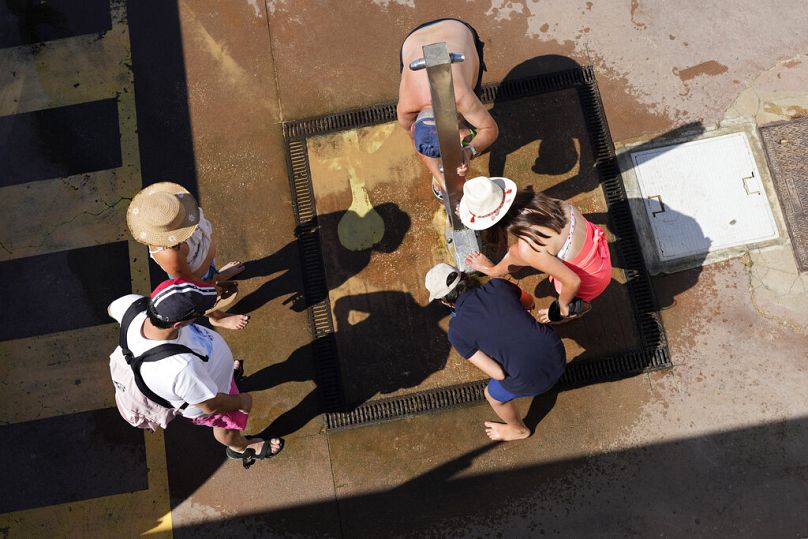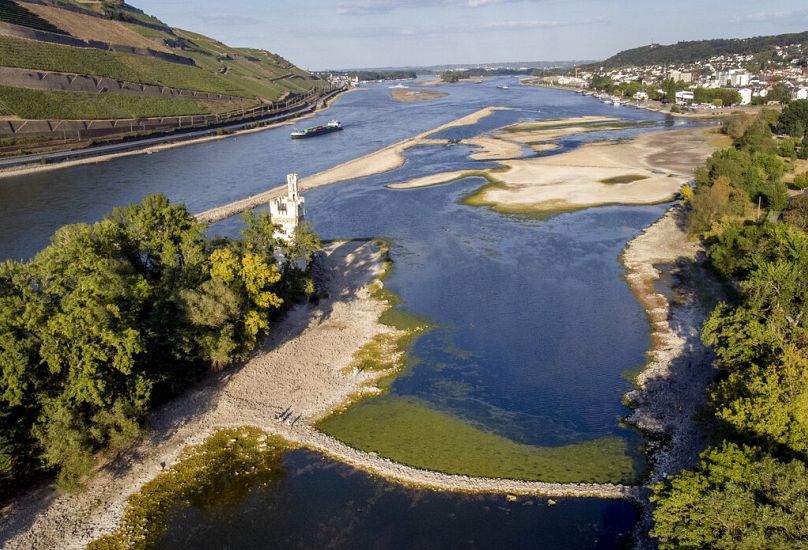When all is said and done, Europeans are still finding their access to water under threat and measures taken to protect this fundamental human right might not be bold enough, Catarina de Albuquerque writes.
For the Berriennois — residents of the tiny village of Berrien nestled in France's mountainous northwest — summer 2022 won’t easily be forgotten.
 ADVERTISEMENT
ADVERTISEMENT
 ADVERTISEMENT
ADVERTISEMENT
Terrifying wildfires, sparked by searing temperatures, ravaged the desiccated alpine landscape, while non-existent rainfall saw water supplies dwindle dangerously low.
Lacking a viable alternative, local authorities opted to draw on reserves from a disused kaolin quarry, only for high levels of arsenic to be detected.
A hasty public messaging campaign warned Berrien’s 900 or so inhabitants not to drink from their taps. In the end, government leaders resorted to shipping in thousands of pallets of bottled water.
It was an imperfect, unsustainable solution to a problem that’s set to get much, much worse.
Water woes coming our way
By the 2070s, as global temperatures rise, research indicates that more than a third of the EU will be under high water stress — and in the next three decades, some 17% of the continent’s people could face extreme water scarcity.
These predictions paint a bleak picture for the future but be under no illusions: climate change is already impacting Europeans’ access to water.
From the water woes of Berrien to the draconian 18-hour-a-day water prohibition in Bonastre, a small town south of Barcelona, to water conservation pleas directed at residents of Oslo — a city not often associated with drought — few corners of Europe were left untouched by the unprecedented heatwave that scorched the continent last summer.
For many, it was an eye-opening event, one that laid bare the misconception that climate change is something happening to other — that is to say, developing — parts of the world.
This overdue revelation leads to an obvious question: is enough being done to protect Europe against its emergent water scarcity crisis?
Policies that work on the conceptual level are rarely foolproof
At the supranational policy-making level, some progress has been made, but there’s still much left to be achieved.
Right2Water, a vigorous continent-wide public pressure campaign, has called on the EU to formally implement the human rights to water and sanitation, as recognised by the United Nations General Assembly in 2010.
In response to the movement, the European Commission has brought forth an obligation on member states to improve or maintain access to safe drinking water for all, with a particular focus on vulnerable and marginalised groups.
How these obligations are dealt with differs from country to country, with those facing the most immediate scarcity issues taking a more proactive approach.
Of this, my native Portugal is a notable example. In the 1970s, emerging from decades of dictatorship and the tumult of the Carnation Revolution, Europe’s westernmost nation had a creaking water management sector in need of root-and-branch reform.
The years that followed saw huge development, with 99% of the country’s running water now safe to drink.
Portugal has also conducted comprehensive scientific studies of its water resources, factoring in climate and demographic forecasts to better understand how usage patterns and availability will evolve as the century progresses.
Human consumption, meanwhile, is prioritised before industrial and agricultural use under Portuguese law, and in areas of greatest water scarcity — such as the sun-soaked Algarve region — authorities have the power to block new business developments if there is a risk to public access.
At a conceptual level, this is a worthy policy; but in practice, such rules are rarely foolproof.
Hitting the right notes doesn't mean the problem is solved
In August, with reservoirs in several parts of the country dropping critically low, the Portuguese government urged dozens of municipalities to increase consumer water prices — a move that critics say could push vulnerable, cash-strapped families towards water poverty.
And herein lies the fundamental problem: politicians might hit the right notes with their "human rights to water and sanitation" rhetoric, and might have the policies and even the laws in place to substantiate that rhetoric.
But when all is said and done, people are still finding their access to water under threat and measures taken to protect this fundamental human right might not be bold enough.
Just look at Tesla's much-feted factory outside of Berlin. Situated in a drought-stricken stretch of Brandenburg — a state co-ruled by the German Green party — the EV manufacturer’s planned expansion is consuming so much water that new subterranean sources are having to be drilled.
As the region’s largest employer, there’s a clear economic and political case for Tesla’s deepening presence in the area. Yet, with local residents and experts alike warning that drinking water reserves could soon be depleted, surely a rethink is required.
Ultimately, despite some promising steps, it’s clear that European governments — possibly under EU direction — must adopt a far more rigorous and integrated approach to water management, one that accounts for our changing climate, and puts human rights at the heart of all water policy decision-making.
Catarina de Albuquerque is the Chief Executive Officer of the United Nations-hosted Sanitation and Water for All (SWA) global partnership. She was the first UN special rapporteur on the human rights to safe drinking water and sanitation.
At Euronews, we believe all views matter. Contact us at view@euronews.com to send pitches or submissions and be part of the conversation.













